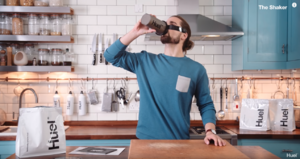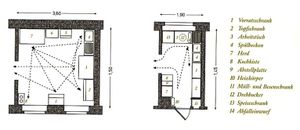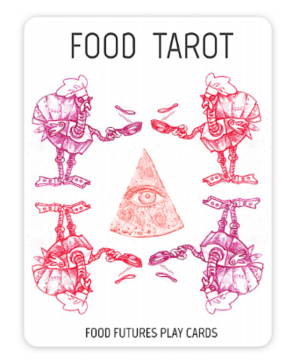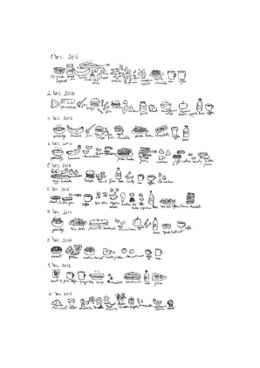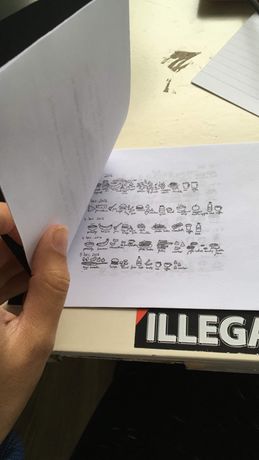User:Alice/Project proposal: Difference between revisions
No edit summary |
No edit summary |
||
| Line 19: | Line 19: | ||
'''How do you plan to make it''' | '''How do you plan to make it''' | ||
I want to conceptualize and host events related to food production, reflecting on the issues mentioned above. I am planning to follow and participate in food events that take place in and around hackerspaces, where hackers, designers and programmers redirect their skillset towards food production and experimentation (but not only). With this in mind, I want to compare and contrast various events in terms of topics, participants and outcomes. I plan to write essays on specific issues which will turn | I want to conceptualize and host events related to food production, reflecting on the issues mentioned above. I am planning to follow and participate in food events that take place in and around hackerspaces, where hackers, designers and programmers redirect their skillset towards food production and experimentation (but not only). With this in mind, I want to compare and contrast various events in terms of topics, participants and outcomes. I plan to write essays on specific issues which will turn into small publications. | ||
| Line 25: | Line 25: | ||
I also plan to participate in a number of events which, hopefully, will give me more insights. So far I have three lined up, in October, November and December. Nonetheless, I plan to start prototyping and testing with such events, starting as early as the [[https://pzwiki.wdka.nl/mediadesign/.py.rate.chnic_sessions|.py.rate.chnic session which I have coming up | I also plan to participate in a number of events which, hopefully, will give me more insights. So far I have three lined up, in October, November and December. Nonetheless, I plan to start prototyping and testing with such events, starting as early as the [[https://pzwiki.wdka.nl/mediadesign/.py.rate.chnic_sessions|.py.rate.chnic session which I have coming up in November]] and continuing throughout the year. | ||
Broad timeline: | Broad timeline: | ||
| Line 47: | Line 47: | ||
Another person that I'm talking to is [http://materie.me/projects Marketa Dolejsova], who is also extremely active in the food scene and has developed a number of amazing projects. I met her in Utrecht during her workshop at CCU, [https://www.creativecodingutrecht.nl/2018/09/11/designing-recipes-for-sustainable-digital-food-futures|Designing Recipes for Sustainable Digital Food Futures] and I plan to keep in touch with her in order to learn more about her practice. | Another person that I'm talking to is [http://materie.me/projects Marketa Dolejsova], who is also extremely active in the food scene and has developed a number of amazing projects. I met her in Utrecht during her workshop at CCU, [https://www.creativecodingutrecht.nl/2018/09/11/designing-recipes-for-sustainable-digital-food-futures|Designing Recipes for Sustainable Digital Food Futures] and I plan to keep in touch with her in order to learn more about her practice. | ||
I am also interviewing a number of other people who have chosen to include liquid meals in their lifestyle, in the hope I will get more insight on their motivation. | |||
[[File:Tarot.png|frameless|The project 'Parlour of Food Futures' by Marketa Dolejsova]] | |||
'''Relation to previous practice''' | '''Relation to previous practice''' | ||
Revision as of 17:00, 10 November 2018
FOCUS FOCUS FOCUS
What do you want to make
For me, it's important that food is used as a medium to discuss a broader social context. My project will take the form of a research into specific community practices, transfer of knowledge and biases, the political act of cooking and food production, and the complete lack of cooking. This is why I would like my project to be manifested through a series of events and experiments in which the participants would deconstruct the practice of cooking and analyze various procedures taken for granted, take apart the structure of a recipe and reconstruct it based on formats more in line with the physical practice. Another aspect I want to test is the concept of collaborative cooking as performative act (e.g: Frankfurter kitchen plan) and ways of reconnecting with the food we eat on a daily basis.
I am interested in the act of cooking, following the instructions of a recipe, handling food and the meaning behind everyday gestures and habits related to food production and consumption. Cooking is often used as an analogy, in order to explain other technical processes and concepts, such as programming. This is done under the assumption that everyone is accustomed to the act of cooking, and can therefore understand another more complicated concept through it. Furthermore, the recipe has often been compared to the computer program, and terms such as recipe and cookbook have been appropriated and used in the programming world to define pieces of code that perform a certain task, and collections of these pieces of code. I see this as a sort of gimmick to ease people's understanding of complex issues, while diminishing the importance and complexity of the medium used for the explanation. In analyzing the role of cooking in our lives, I would like to focus on the practices of everyday life, magnifying the often overlooked actions we take every day regarding our sustenance, and reflecting on the reasoning behind certain decisions.
Another aspect of cooking that I want to focus on is it's representation as a time waster. In Silicon Valley culture, efficiency of the mind and body are the ultimate goal to achieve, and whatever keeps people away from that goal needs to be removed. Cooking and eating meals have been replaced with drinking complete food liquid meals which contain all nutrients necessary for the entrepreneurial lifestyle, without the hassle of planning, prepping, chewing or cleaning.
How do you plan to make it
I want to conceptualize and host events related to food production, reflecting on the issues mentioned above. I am planning to follow and participate in food events that take place in and around hackerspaces, where hackers, designers and programmers redirect their skillset towards food production and experimentation (but not only). With this in mind, I want to compare and contrast various events in terms of topics, participants and outcomes. I plan to write essays on specific issues which will turn into small publications.
What is your timetable
I also plan to participate in a number of events which, hopefully, will give me more insights. So far I have three lined up, in October, November and December. Nonetheless, I plan to start prototyping and testing with such events, starting as early as the [session which I have coming up in November] and continuing throughout the year.
Broad timeline:
Oct-Dec: Research, prototyping, gathering insights from key people/events Jan-Feb: Finalizing writing, organizing at least one event Mar-May: Solidifying the concept for the final project and how it can be translated into the grad show June-Jul: Final touches
Why do you want to make it
Reading on food culture, food history and other food related topics has been one of my main interests for many years, so this project comes as a natural progression for me. Furthermore, my recent introduction to the world of software culture has opened new possibilities and insights. Now I want to explore the relationship between the two, how the principles connected to one can be transferred to another, what is lost and what is gained through the association of the two.
A further point to make here is that I have come to programming from completely different mediums. For me, it is not the end goal, but a tool I use to prove a point, or to practice a concept. At times, when working on a project within this course, I feel like the focus shifts too much towards the technical aspects, and away from the conceptual, subjective, embodied self. Coming from a deep, lifelong interest in food culture, I find it surprising to see it now used as an 'easy way in' to tech world. I am conflicted on my position towards this path, but I am extremely interested in the critical exploration, and the social and political implications of this connection. I also want to reflect more on how to bring the body back into the equation when it comes to conversations on food, through physical movement, memory, taste, etc.
Another aspect that I am looking for with this project is creating a community around food culture. This is something I have been looking for for years, and have never been able to find/achieve/integrate in. An inclusive community of people keen on playful and critical experimentation with food, and insightful conversation on this aspect of our lives that is often overlooked, is definitely my goal. One step towards this would be to create a platform which brings together all kinds of food-related events and the people organizing and participating in these conversations.
Who can help you and how
Talking to people who have taken time to reflect on the relationship between humans and the food they eat is the most valuable source of information for me at this point. So far, Femke Snelting has been my biggest inspiration, since many of the topics I am reflecting on are part of the work she has already done in the past decade. Among her projects that inspire me are her essay on Stampott and her code inspired by Isabelle Beeton's instruction book for housewives.
Another person that I'm talking to is Marketa Dolejsova, who is also extremely active in the food scene and has developed a number of amazing projects. I met her in Utrecht during her workshop at CCU, Recipes for Sustainable Digital Food Futures and I plan to keep in touch with her in order to learn more about her practice. I am also interviewing a number of other people who have chosen to include liquid meals in their lifestyle, in the hope I will get more insight on their motivation.
Relation to previous practice
In the past couple of months I have researched quite a bit about women's relationship with technology. More specifically, I was interested in how women were first introduced to the technological world and were given tasks that seemed, at the time, menial and basic. These tasks eventually became the basis of programming today, a culture completely appropriated by men. This research materialized into a new programming language called over/under in which weaving instructions were translated into code and applied onto text.
Similarly, food production has always been associated with women's work, done behind closed doors, with little or no attention being given to it from the outside. In time, cooking has become appropriated by a different culture, hacking culture, stripped of its emotional layer and turned into a programmatic practice. I want to reflect on this phenomenon and come up with ways to translate my own personal involvement.
Looking back even further, I have always been an avid reader of all things food-related, especially food in social and political contexts. The disconnection between our daily food habits and the whole world that exists behind the scenes has also been one of my main paths of exploration. My previous work has also involved shifting the focus from other daily activities which might seem more important or relevant, to the food consumed, the decisions that lead to the food consumed and the background of these decisions and how they reflect the way people relate to the world around them. For instance, I created a zine based on a food diary that I kept for an entire month, in which I documented through drawing every single thing I consumed, every day. I found it to be a very meaningful experiment, since it revealed my way of capturing my own life in memory, a way that largely revolves around the food I eat.
Relation to a larger context
As stated earlier, the one connection that jumps out right now is the appropriation of culture that has emerged in technology after world war 2, and is still ongoing today. I am also interested in the idea of food preparation as an anticapitalist political act (as expressed by Michael Pollan) in which people can become more than simple consumers in an industry ruled by big corporations. Other ideas to reflect on are kitchen tools, from tools of oppression (as expressed by Martha Rosler in Semiotics of the Kitchen) to status symbols (https://smartypans.io/), techno-idealism and techno-solutionism in food.
Bibliography
Avakian, A.(2014) Cooking Up Lives: Feminist Food Memoirs. Feminist Studies, Food and Ecology 40, pp.277–303. (place needed)
Bello, W. (2009) The Food Wars. Verso.place needed
Brillat-Savarin, J.-A.(1994) The Physiology of Taste. London:Penguin Books.
Busch, A.(1999) Kitchen, in: Geography of Home: Writings on Where We Live. New York: Princeton Architectural Press. pp.39–50.
Cairns, K., Johnston, J., Baumann, S.(2010) Caring About Food: Doing Gender in the Foodie Kitchen. Gender and Society 24, pp.591–615.place needed
Catterall, C. (Ed.) (1999) Food: Design and Culture. London: Laurence King Publishing.
Davies, S.R. (2017) Hackerspaces: Making the Maker Movement. Cambridge: Polity Press.
de Certeau, M., Giard, L., Mayol, P. (1998) The Practice of Everyday Life, Volume 2: Living and Cooking. Minneapolis: University of Minnesota Press.
Dunne, A., Raby, F. (2013) Speculative Everything. Design, Fiction, and Social Dreaming. Cambridge, Massachusetts: The MIT Press.
German, L. (1989) Sex, Class and Socialism. Bookmarks, University of California.
Pollan, M. (2014) Cooked: A Natural History of Transformation. London:Penguin Books.
Steel, C. (2008) Hungry City: How Food Shapes Our Lives. London:Vintage.

